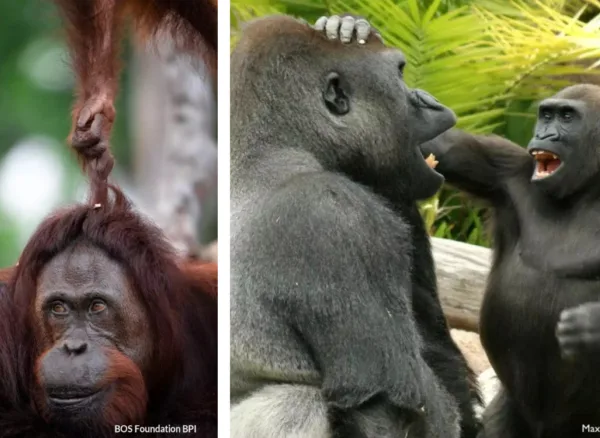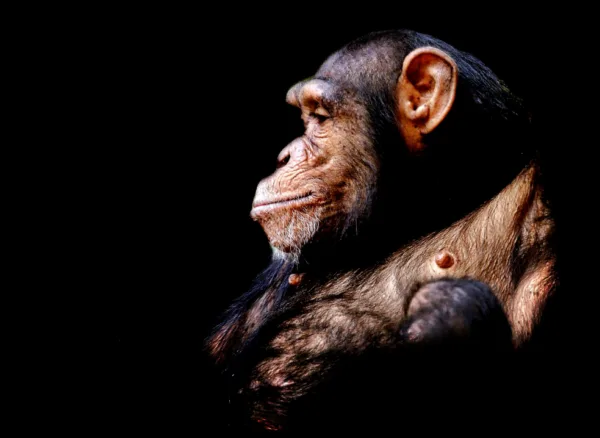Menu

Dr. Frans de Waal and Dr. Michael Levin, two researchers who've spent decades exploring the science of cognition, are featured in this Stories of Impact podcast.
Listen with the player below to learn how they each became convinced that for humans to flourish, we need to better understand and honor the diversity of intelligences on the planet we share.
The late Dr. Frans de Waal, renowned primatologist and ethologist, leaves behind a legacy of over 40 years of research exploring the social interactions, emotions, and cognitive abilities of animals, particularly primates like chimpanzees. His work didn't just shed light on not only the complexities of primate behavior primates, but also on the nature of humanity. He was ahead of his time in recognizing the sophistication of intelligences across different species. Sadly, he passed away in spring of 2024 at the age of 75. A few months before his passing, de Waal spoke with Stories of Impact about the changes in science's perspective on animal cognition that he witnessed and helped instigate.
"Diverse intelligences, for me, means, what do the animals need in their environment," said de Waal. "We humans, we are good at language and technology, and we have a few other intellectual capacities, obviously, but we are most impressed by those things, and so if animals don't do these things...we're not impressed." Yet animals excel in many remarkable cognitive feats. For instance, he noted, octopuses are masters of camouflage, bats utilize echolocation to catch prey in the dark, and birds demonstrate impressive memory skills, storing food in thousands of locations. Elephants possess extraordinary olfactory abilities, far superior to ours or even that of dogs. We tend to overlook these abilities because they differ from our own strengths, according to de Waal. "We misjudge the elephant because we think like humans and not like elephants!"
When his work first began, the restrictions, assumptions, and limitations in the field of cognition both frustrated and challenged de Waal. At the time, science had a very mechanistic view; animals were perceived as mere machines, and the idea that they possessed emotions and cognitive abilities was largely dismissed. "When I was a student, people would laugh at the idea. Humans could understand, but not animals," he shared. However, over time, a paradigm shift did occur. This was thanks, in part, to groundbreaking studies showing emotions and morality in no-human primates, like de Waal's experiment to see what happens when two monkeys are "paid" unequally with different foods. Contemporary science now acknowledges "there's all sorts of minds in the animal kingdom and we have different pinnacles of intelligence at different places," said de Waal in the interview. "We don't look at it as a scala naturae anymore, like where humans are at the top and all the other animals are dumber than us. We are impressed actually, by the enormous amount of intelligence we see in other species. We have now a more evolutionary approach. We think more like, what do the animals need in their environment? What are the skills that they need?"
De Waal hoped that his research would help pave the way for a better future for all animals, including animals in relationship with the humans who are responsible for their wellbeing. "Once we start talking about the intelligence and the emotions of animals and accept that they have inner lives that are sometimes quite complex...it gives us a different appreciation of animal life for sure," de Waal emphasized. "We have to treat them better than we do."
Listen to the above podcast for more on animal cognition from Dr. Frans de Waal.
Dr. Michael Levin, distinguished professor of biology at Tufts University and associate faculty member at Harvard's Wyss Institute is a leading researcher on the intelligence of the very smallest building blocks of life, and how intelligence transfers from cells to cell collectives to complete, living beings. His work as a developmental and synthetic biologist spans a wide range of topics from the bioelectric properties of cells to the creation of living robots in amphibian eggs. He joined Stories of Impact for a conversation on how research into diverse and unconventional intelligences can help humanity define its place in the universe, and what this work may mean for practical advances in fields like regenerative medicine and artificial intelligence.
In the interview, Levin shared that he and his colleagues at the Levin Lab are interested in developing comprehensive frameworks for how intelligences come into being and how they scale up, with the goal of predicting, shaping, and potentially creating new cognitive systems. He envisions the concept of intelligences as a spectrum or continuum of cognitive systems. This offers a way to "compare all kinds of agents ranging across minimal active matter, cells, tissues, organs, bio-engineered constructs, hybrids, cyborgs hybrids, aliens, artificial intelligences, either software or hardware. All of these have something in common to the extent that they have intelligence and agency — they have some profound things in common...the ability to reach specific goals in some problem space with diverse degrees of ability to do that...and that's what we try to understand."
Like de Waal, Levin believes to understand the diversity of intelligences in the universe, its key to expand our human-centric views and go beyond what's seen through the eye of the beholder. Intellectual humility and multi-disciplinary collaboration is needed. One of the challenges the Levin Lab faces in "figuring out the rules for the scaling of cognition" stems from the limits of the human brain's perception. Human senses are primarily outward-facing, operating within a narrow scope of signals, temporal rates, and size scales. Our ability to detect intelligence in systems beyond medium sizes and speeds in the physical world is "not great," said Levin. "When you make statements about the intelligence level of any given system — it might be an organoid that you've built, or it might be the universe — you're basically taking an IQ-test yourself," he explained, "because all you're saying is this is what I have figured out this system to be capable of. And you may have missed all the exciting aspects of it. You might've missed the space in which it works." As he clarifies in his websites' FAQs, it's "not whether we, as external observers, are smart enough to notice if the system has a body in some unconventional problem space: it's whether the system itself believes it has a body and a perception-action loop in a space it models."
Levin's research has led him to see "all intelligence is collective intelligence," because everything is made of a collection of smaller parts. He says one of the big questions we need to "work out" especially as technology advances, is "how specifically the mechanisms by which independent competent subunits — be they molecular networks or cells or tissues or organs — scale up to have a centralized Self — I call it a self with a capital S, a novel Self that operates, in another space with new preferences and competencies that don't belong to any of the individuals."
For humans to flourish, and "thrive as a mature species over the next, decades and centuries and so on," says Levin, "we have to improve this ability to understand what it is for new collective beings to come into the world and how we learn to predict and shape their goals and their preferences. This idea that we can now clearly make new things that haven't been here before requires us to go beyond our really very primitive, old categories, these binary categories of, is it a machine? Is it a robot? Is it a living organism? Is it cognitive?"
Listen to the above podcast to learn more about diverse intelligences from Dr. Michael Levin.
Learn about Templeton World Charity Foundation's Diverse Intelligences priority.
Built upon the award-winning video series of the same name, Templeton World Charity Foundation’s “Stories of Impact” podcast features stories of new scientific research on human flourishing that translate discoveries into practical tools. Bringing a mix of curiosity, compassion, and creativity, journalist Richard Sergay and producer Tavia Gilbert shine a spotlight on the human impact at the heart of cutting-edge social and scientific research projects supported by TWCF.




